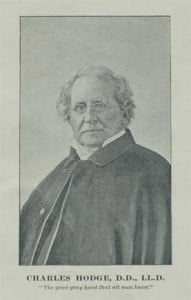A Short Life, by Modern Standards, But Well Used of the Lord
Edward Chaffin Davidson was born in Maury County, Tennessee, on February 17th, 1832, and died at Oxford, Mississippi, on April 25th, 1883, at the age of 51.
When he was only five or six years old, his father moved to LaFayette County, in Mississippi, and settled a few miles from Oxford. There he grew up, becoming a communicant of the College Hill church at an early age.
He was graduated at the University of Mississippi in 1854, entered Columbia Theological Seminary in 1857, and completed his course of study there in May, 1860, having taken the full three-year curriculum. He was received from the Chickasaw Presbytery as a licentiate in October of 1860 and ordained on April 19, 1861 by the Presbytery of North Mississippi. Rev. Davidson was the first pastor of the Sands Springs church, which had been organized by the Rev. Angus Johnson in the Fall of 1850 with 22 members. As was common in those days, Rev. Davidson served in what was termed a “yoked pastorate,” serving simultaneously as pastor of the larger Water Valley Presbyterian Church, 1861-1878. During this latter pastorate, he earned his Master of Arts degree from the University of Mississippi, in 1866. As an aside, in the sermon log book maintained by the Rev. Thomas D. Witherspoon, there is a notation of his having exchanged pulpits with Rev. Davidson on July 15th, 1860.
For several years before his death he resided near Oxford, where he taught in the preparatory department of the University of Mississippi, and was the superintendent of the public schools of the county. During this time he supplied the neighboring churches, including the Byhalia and Wall Hill Presbyterian churches; in 1882 he supplied the College Hill and Hopewell churches.
“He was one of the best of men and a most excellent preacher. He was much loved in a wide circle. He twice represented his Presbytery in the General Assembly, in 1867 and 1873, and was Moderator of the Synod of Memphis in 1880. From 1871-1882, Rev. Davidson served as the Stated Clerk of the Presbytery of North Mississippi. He does not appear to have authored any published works. He had been ill for over two months prior to his death, and at last fell asleep in Jesus. His end was peaceful.”
Rev. Davidson left a widow, one daughter recently married, and four young children (two sons and two daughters)” to mourn his departure.
Words to Live By:
To fall asleep in Jesus. Can any of us ask more?
Sources:
Graves, Fred R., North Mississippi Presbytery. Sardis, [MS]: Southern Reporter, 1942, pp. 21, 41, 45, 47.
Memorial Volume of the Semi-Centennial of the Theological Seminary at Columbia, South Carolina. Columbia, SC: Presbyterian Publishing House, 1884, pp. 252-253.
Winter, Robert Milton, Shadow of a Mighty Rock. Franklin, TN: Providence House Publishers, 1997, pp. 237, 244-245.

